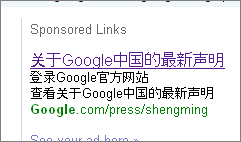Thursday, March 25, 2010
Google’s Drummond on China Strategy Shift (it wasn’t just the hacking incident, but also increasing pressure to censor more)
The Atlantic this week spoke with Google chief legal officer David Drummond about Google’s strategy change in China (Google now forwards traffic to Google.cn to their uncensored Google.com.hk). Quote from the phone interview paraphrase:
We have moved the physical location of it [to Hong Kong], and the virtual location. The experience we are trying to offer to Chinese users is like the one on Google.cn, but done without the censorship on our part. (...)
People tended to see this as an all or nothing kind of battle between us and the Chinese government, and that based on what we said, we were either going to pull out of China entirely, or else say, Never Mind! From the beginning our view had been, we would like to stay in China and have an operation there and serve the market there, and serve it as locally as we can. We’re just not willing to censor the search results any more.
(Google shouldn’t wonder too much that people saw it as all or nothing – that’s how they themselves suggested the situation in was China when they announced why they would start to self-censor Chinese web search in 2006: “Filtering our search results clearly compromises our mission. Failing to offer Google search at all to a fifth of the world’s population, however, does so far more severely. Whether our critics agree with our decision or not, due to the severe quality problems faced by users trying to access Google.com from within China, this is precisely the choice we believe we faced.” In other words, Google said they were facing a choice between no Google search at all for Chinese users, or a filtered search.)
David continues to explain that the hacking incident wasn’t the isolated reason for their strategy change (my emphasis):
Since the Beijing Olympics, our experience in China has gotten worse. Although we have gained market share, it has become more and more difficult for us to operate there. Particularly when it comes to censorship. We have had to censor more. More and more pressure has been put on us. It has gotten appreciably worse – and not just for us, for other internet companies too.
So we increasingly came to feel that the original premise of our entry into China was being undermined.
David adds, “We originally went to them with a request [for a change in the filtering rules]. They made it clear that the self-censorship system was the law there and it wasn’t going to change.”
On a related note, Google is using AdWords to promote a Chinese version of their recent blog post where David Drummond announces the Hong Kong redirect. Ran across the following just now in a search for something Google-related from within China:

Also, according to the New York Times Google’s, Alan Davidson, director of public policy for Google, “told a joint Congressional panel that the United States and other democracies should draft trade agreements that incorporate pledges to keep Web sites uncensored. He said censorship had become more than a human rights issue and was hurting profit for foreign companies.”
[Thanks Jérôme!]
>> More posts
Advertisement
This site unofficially covers Google™ and more with some rights reserved. Join our forum!
